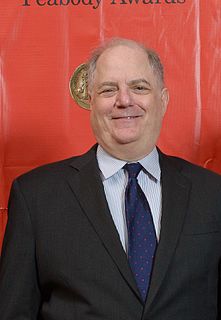Top 168 Consumerism Quotes & Sayings - Page 3
Explore popular Consumerism quotes.
Last updated on April 19, 2025.
For me what was amazing was consumerism of people survived after Katrina. You see in a yard that the SUV is gone but they left the Ferrari or the more expensive car because it just wasn't practical. They couldn't get all their stuff in it. So you see this beautiful car totally destroyed; motorcycles. You walk into these houses - we were with the New Orleans police when they would go into the houses - we'd go through these houses and we were just amazed at how much stuff that had been accumulated and how much was left behind.
As a mode of public pedagogy, a state of permanent war needs willing subjects to abide by its values, ideology, and narratives of fear and violence. Such legitimation is largely provided through a market-driven culture addicted to the production of consumerism, militarism and organized violence, largely circulated through various registers of popular culture that extend from high fashion and Hollywood movies to the creation of violent video games and music concerts sponsored by the Pentagon.
Our world, so we see and hear on all sides, is drowning in materialism, commercialism, consumerism. But the problem is not really there. What we ordinarily speak of as materialism is a result, not a cause. The root of materialism is a poverty of ideas about the inner and the outer world. Less and less does our contemporary culture have, or even seek, commerce with great ideas, and it is that lack that is weakening the human spirit. This is the essence of materialism. Materialism is a disease of the mind starved for ideas.
Just the other day, I was in my neighborhood Starbucks, waiting for the post office to open. I was enjoying a chocolatey cafe mocha when it occurred to me that to drink a mocha is to gulp down the entire history of the New World. From the Spanish exportation of Aztec cacao, and the Dutch invention of the chemical process for making cocoa, on down to the capitalist empire of Hershey, PA, and the lifestyle marketing of Seattle's Starbucks, the modern mocha is a bittersweet concoction of imperialism, genocide, invention, and consumerism served with whipped cream on top.
Now, it’s true that some of the protesters are oddly dressed or have silly-sounding slogans, which is inevitable given the open character of the events. But so what? I, at least, am a lot more offended by the sight of exquisitely tailored plutocrats, who owe their continued wealth to government guarantees, whining that President Obama has said mean things about them than I am by the sight of ragtag young people denouncing consumerism.
Many ideas have struggled over the centuries to dominate the planet. Fascism. Communism. Democracy. Religion. But only one has achieved total supremacy. Its compulsive attractions rob its followers of reason and good sense. It has created unsustainable inequalities and threatened to tear apart the very fabric of society. More powerful than any religion, it has reached into every corner of the globe. It is consumerism
Corporate America limits the world to consumerism. Science can limit it to the material world. Even religion limits it to a lot of theories that can explain everything. I think we need cinema to break that apart and remind us that we're not in control, and we don't understand as much as we think do.
...the tragedy of consumerism: one acquires more and more things without taking the time to ever see and know them, and thus one never truly enjoys them. One has without truly having. The consumer is right-there is pleasure to be had in good things, a sacred and almost unspeakable pleasure, but the consumer wrongly thinks that one finds this pleasure by having more and more possessions instead of possessing them more truly through grateful contemplation. And here we are, living in an economy that perpetuates this tragedy.
I've also been documenting an unsustainable way of life. And you see in peoples' stories that this world of consumerism does not support the moral and spiritual values - of family and community - that people feel are most important. From an environmental perspective, the quest for more and more is not going to be possible on this planet. This is a historical documentation of an unsustainable path, and my hope is that this work allows people to think about their own agency and the potential for change.
Consumerism has led us to become used to an excess and daily waste of food, to which, at times, we are no longer able to give a just value, which goes well beyond mere economic parameters. We should all remember, however, that throwing food away is like stealing from the tables of the the poor, the hungry!
Perhaps if we could popularise through the techniques of branding and consumerism, a different idea, a different narrative, perhaps the world can change. After all it changes constantly and incessantly, it's just the perceptions that we have are governed by people with self-interest and are not inalignment with the health and safety of us as individuals or as a planet.
It's no surprise that if you look at the development of the economy, of consumerism, of all these things that have gotten out of hand over the last hundred years, it happened when men were purposeless, when they didn't actually have a legitimate reason to be moving the species forward because the machines were doing all the hard work.
Our society is falling back increasingly on rampant consumerism and self-promoting social media as a way for people to feel that their lives matter - self-centered means of numbing the questions of mattering. Culture has relapsed back into the self-aggrandizing, glorifying answers that the Athenians had presumed, which had Socrates railing against them until he got so annoying that they killed him.
Side by side with the miseries of underdevelopment...we find ourselves up against a form of superdevelopment, equally inadmissable. This superdevelopment consists in an excessive availability of material goods for the benefit of certain social groups and makes people slaves of "possession" and immediate gratification, with no other horizon than the multiplication or continual replacement of the things already owned with others still better. This is the civilization of consumption, or "consumerism," which involves so much throwing away and waste.
Unfortunately, we live at a moment in which ignorance appears to be one of the defining features of American political and cultural life. Ignorance has become a form of weaponized refusal to acknowledge the violence of the past, and revels in a culture of media spectacles in which public concerns are translated into private obsessions, consumerism and fatuous entertainment.
It's been a real success - one of the great business successes in the United States - to break down organization, to separate people too: it's part of consumerism. If you can drive people toward individual consumption, that's the highest goal in life. And furthermore, drive them into debt so they're trapped. You don't have to worry about a democracy function because people are trapped and they're alone.
Before our eyes we have the results of ideologies such as Marxism, Nazism and fascism, and also of myths like racial superiority, nationalism and ethnic exclusivism. No less pernicious, though not always as obvious, are the effects of materialistic consumerism, in which the exaltation of the individual and the selfish satisfaction of personal aspirations become the ultimate goal of life. In this outlook, the negative effects on others are considered completely irrelevant.
We shuffle out of office buildings after being laid-off by draconian bosses; we sit on hold for ten minutes only to be told by a supervisor that the charge on our cable bill can't be removed; we click a crying emoji on Facebook as our last whimper of protest. So rather than end the story ["Ice Age"] with the expected violence and destruction of evil, I wanted to focus on the way the characters end up sabotaging their own community though their attachments to the consumerism of the old world.
Our task is to build cultural fortresses to protect our emerging nativeness. They must be strong enough to hold at bay the powers of consumerism, the powers of greed and envy and pride. One of the most effective ways for this to come about would be for our universities to assume the awesome responsibility to both validate and educate those who want to be homecomers -- not necessarily to go home but to go someplace and dig in and begin the long search and experiment to become native.
The great danger in today's world, pervaded as it is by consumerism, is the desolation and anguish born of a complacent yet covetous heart, the feverish pursuit of frivolous pleasures, and a blunted conscience. Whenever our interior life becomes caught up in its own interests and concerns, there is no longer room for others, no place for the poor.
We must act now and wake up to our moral obligations. The poor and vulnerable are members of God's family and are the most severely affected by droughts, high temperatures, the flooding of coastal cities, and more severe and unpredictable weather events resulting from climate change. We, who should have been responsible stewards preserving our vulnerable, fragile planet home, have been wantonly wasteful through our reckless consumerism, devouring irreplaceable natural resources.
I have to confess that I've never been a great fan of Christmas or, as it's known in our house, The Monster That Ate the Last Third of the Year. It's mostly the rampant consumerism I object to, but I'm also a little wary of the annual crop of new Christmas stories and sometimes wonder why anyone bothers.
I think love is often a bit selfish, even before we had consumerism. That's not new. A consumer society gives you the illusion of having massive amounts of choice and saddles you with the freedom of being able to dabble in that choice. And at the same time, you are left with the tyranny of self-doubt and uncertainty about whether you made the right choice.
All of us experience the sad effects of blind submission to consumerism. In the first place it represents crass materialism. At the same time it represents a radical dissatisfaction because one quickly learns that the more one possesses, the more one wants, while deeper aspirations remain unsatisfied and perhaps even stifled.
Uncontrollable consumerism has become a watchword of our culture despite regular and compelling calls for its end. The United States has more malls than high schools; Americans spend more time shopping than reading. ... Some of the most insightful writing about the American character over the nation's history has been about neither freedom nor democracy but about the crazed impulse to acquire things.
Mass consumption, advertising, and mass art are a corporate Frankenstein; while they reinforce the system, they also undermine it. By continually pushing the message that we have the right to gratification now , consumerism at its most expansive encouraged a demand for fulfillment that could not so easily be contained by products.
Everything is deeply affected by the dominant culture. Consumerism is huge in the US. This is by far the wealthiest [nation], but also the biggest consumer in the world. Which means that a lot of things get used, a lot of things get wasted, and a lot of things get churned out in ways that are wasteful.
The latest trend seems to be these DJs doing pre-recorded sets, in perfect pitch with the lights & acts on stage. Everything is centred around the action from the stage. It doesn't even demand action coming from the crowd! Passive consumerism or something. Mayhem with an overwhelming sound that isn't actually good music. More like diarrhoea.
Green consumerism generally, and 'healthy' products and lifestyles in particular, contain quite precise notions about how an individual should consider his or her well-being. Not only is the market-place celebrated but an understanding of the 'natural body' itself becomes fetishised and idolised. Normality seems to have wholly dispensed with bodily illness and pain. Perfection is the norm, and one that can be gained through acquiring the correct products and perfecting the body.
As businessmen caught a glimpse of the potentialities inherent in endlessly expanding the wants of people under consumerism, forced draft or otherwise, many began to see blue skies... What was needed was strategies that would make Americans in large numbers into voracious, wasteful, compulsive consumers-and strategies that would provide products assuring such wastefulness. Even where wastefulness was not involved, additional strategies were needed that would induce the public to consume at ever-higher levels.
America always put forth this phony melting pot theory, but it's a reality now. They couldn't accomplish the melting pot economically; they couldn't accomplish it politically, or through education and science. But America has become a consumer society, and I see young people in the cities - of all colors and races - hanging out together over consumerism.
An extraterrestrial being, newly arrived on Earth - scrutinizing what we mainly present to our children in television, radio, movies, newspapers, magazines, the comics, and many books - might easily conclude that we are intent on teaching them murder, rape, cruelty, superstition, credulity, and consumerism. We keep at it, and through constant repetition many of them finally get it.
In this state of total consumerism-which is to say a state of helpless dependence on things and services and ideas and motives that we have forgotten how to provide ourselves-all meaningful contact between ourselves and the earth is broken. We do not understand the earth in terms either of what it offers us or of what it requires of us, and I think it is the rule that people inevitably destroy what they do not understand.
Modern society will find no solution to the ecological problem unless it takes a serious look at its lifestyle. In many parts of the world society is given to instant gratification and consumerism while remaining indifferent to the damage which these attitudes cause. Simplicity, moderation and discipline, as well as a spirit of sacrifice, must become part of everyday life, lest all suffer the negative consequences of the careless habits of a few.
The idea is the least labor and capital and resources you put together and the more you accumulate the better capitalist you are. So the suggestion I will make to you is that the idea of constant accumulation, which is what America is about, what consumerism, NAFTA are about, means that you always take more than you need and you don't leave the rest. So I suggest that it is possible from an indigenous world view that capitalism is inherently out of order with natural law.
Let us be bold enough to ask ourselves as Christians whether the Church of the Lord Jesus in the United States has anything to say to our nation and its ideologies of materialism, possessiveness, and the worship of financial security. Are we courageous enough to be a sign of contradiction to consumerism through our living faith in Jesus Christ? Are we committed enough to his gospel to become a countercurrent to the drift?
Many teachers of the Sixties generation said "We will steal your children", and they did. A significant part of America has converted to the ideas of the 1960s - hedonism, self-indulgence and consumerism. For half of all Americans today, the Woodstock culture of the Sixties is the culture they grew up with - their traditional culture. For them, Judeo-Christian culture is outside the mainstream now. The counter-culture has become the dominant culture, and the former culture a dissident culture - something that is far out, and 'extreme'.
Most Christian 'believers' tend to echo the cultural prejudices and worldviews of the dominant group in their country, with only a minority revealing any real transformation of attitudes or consciousness. It has been true of slavery and racism, classism and consumerism and issues of immigration and health care for the poor.
This is what they have suppressed so long. This is why they are so afraid of the psychedelics, because they understand that once you touch the inner core of your own and someone else's being you can't be led into thing-fetishes and consumerism. The message of psychedelics is that culture can be re-engineered as a set of emotional values rather than products. This is terrifying news.










































